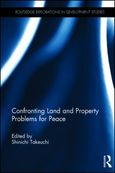Confronting Land and Property Problems for Peace

A book entitled Confronting Land and Property Problems for Peace, which is based on JICA-RI’s research findings, was published by Routledge on May 27.
The volume compiles the findings of JICA-RI’s research project “Land and Property Problems in Post-conflict State-building and Economic Development” from 2011 to 2013. It examines a range of land and property problems in conflict-affected settings.
Conflict-affected countries, characterized by weak governance, return of refugees and internally displaced persons (IDP), and arbitrary policies, are prone to problems over land and properties. Since the land and property problems directly influence people’s livelihoods, those issues should be properly addressed in order to secure the legitimacy of the state, and to improve people’s everyday lives through inclusive economic development.
Building on this background, the JICA-RI research project attempts to analyze the nature of land and property problems in conflict-affected situations as well as the efforts by the governments and of the international community. The project also attempts to elucidate effective policy measures from a long-term perspective to ensure sustainable peace-building through comparative case studies in eight diverse countries*.
To date, the issues of land ownership have been analyzed and discussed as a topic in the development research.. This research, focusing the problems in conflict-affected settings, examines the problem from a long-term perspective, rather than concentrating only on the immediate phase of emergency and humanitarian assistance. While the previous literature focuses on the response from external actors such as the international community, this research attempts to focus on local actors including the relevant governments and eventually re-examining the roles of the external actors.
The book suggests the following policy implications based on the research findings.
1) Although restitution of land and housing to returnees is an important endeavor, it is not always the best strategy to restore the conditions before the conflict.
2) It is crucial to strengthen a conflict resolution mechanism, especially a mediation system, in the conflict-affected fragile situations.
3) Problems over land require comprehensive governance, including relevant administration and judiciary, to be improved. In the meantime, institutions should be established to ensure that private investments will not have adverse effect on the lives of local people.
As humanitarian aid workers have so far played a key role in discussing the post-conflict land and property problems, there remains a gap in this issue between humanitarian assistance and development assistance. Development assistance workers, therefore, should engage in discussion at an earlier stage of post-conflict phase so that the perspectives of land governance will be incorporated into peace-building and long-term development assistance.
The JICA-RI research project was conducted as an international collaborative research involving 14 researchers from seven countries. From JICA-RI, then Visiting Fellow Shinichi Takeuch edited the book, wrote the introduction, and co-authored the case studies on Rwanda and Burundi; former Senior Research Fellow Mari Katayanagi and former Research Fellow Ryutaro Murotani respectively contributed to the case studies on Bosnia-Herzegovina and Cambodia; and the three co-authored the conclusion chapter.
* South Sudan, Uganda, Rwanda, Burundi, Bosnia-Herzegovina, Colombia, Cambodia, and Timor-Leste
scroll